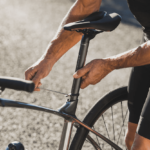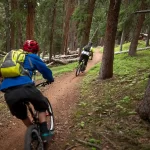Brakes are some of the essential components in any moving vehicle, including your bicycle.
If the bicycle brakes aren’t working correctly, it can lead to accidents and put you in serious trouble. This can happen due to a failure or damage of a part.
There could be two reasons why you’re here at this blog right now:
The reasons are that your bike’s brakes aren’t working correctly or you want a piece of casual information about bicycle brakes. For both reasons, you’re at the right place. In this article, we’ve written an ultimate guide on why your bicycle brakes aren’t working.
Stay tuned to the article to get all the necessary information and answers.
Types of brakes on a bicycle:
Bicycles come in different types of brakes. It can be an old-school V brake, disc brake, or flagship hydraulic brake.
V-Brake
If you got a simple and old-school inexpensive bicycle, then probably your bike is mounted with V-brakes. V-Brakes use friction to stop the tire. They consist of two holders attached at the dual sides of the rim. Each holder has a dedicated brake calliper that interacts with the rim to stop the tire.
When you press the brake lever, the wire from which the holder is connected is stretched. This stretchiness causes the brake callipers to interact with the rim, producing extreme friction that stops the tire. This is how V-brakes work!
The calliper’s material is usually rubber and plastic, a combination that offers a huge amount of resistance and helps your tires to step down due to friction.
Disc Brakes
Unlike V-brakes, disc brakes are more reliable, easy to maintain, and offer an extensive lifespan. These types of brakes usually come in some expensive sports and premium quality bikes. Such as premium road bikes and mountain bikes.
The disc brakes consist of a calliper and a disc firmly attached to the tire from where the tire connects with the bicycle. Instead of callipers, callipers apply the friction on the disc to stop the tire.
The callipers are connected with the brake lever through a wire mechanically. When the brake lever is applied, the wire stretches the callipers and causes them to interact with the disc, producing friction, and stopping the bike.
Hydraulic Brakes
Hydraulic brakes are almost the same as disc brakes. However, instead of using wires to connect the brake lever with the calliper, the manufacturers use a hydraulic piston to transfer the lever’s force into callipers.
Hydraulic brakes are much more efficient and highly reliable than regular disc brakes. Unlike disc brakes, they don’t have any wiring mechanism, which is why hydraulic brakes can cut off in sudden jerks. Without any wonder, hydraulic brakes are much more efficient and reliable than disc brakes.
However, its pricing is proportional to its quality as a reliable and efficient technology. Usually, high-end MTB brands equip them with their high-end mountain bikes.
Primarily, it’s used in the industrial-grade professional mountain and high-end electric bikes.
Why do bike brakes stop working?

There are many reasons why your bicycle brakes have stopped working. No wonder the bike’s brakes are one of those components that run out first. Their life is smaller than other components of the bike and will eventually stop working after a specific usage time.
However, if your brakes aren’t working, it can be due to the failure between the connection of brakes with lever, runout of calliper pads, damage to callipers, damage to rim or disc, or can be a bubble in the hydraulics.
Let’s get deeper and break it down:
Why are my brakes not engaging?
If your bike brakes are not engaging, worry not; we’ll break down the cause and fix it for you. We have you covered, whether it’s your disc brakes, V-brakes, or hydraulic brakes.
Continue reading the article:
Why are the disc brakes on my bike not working?

Here’s the breakdown of why your disc brakes aren’t working:
Failure of brake wires
You should first check the braking wires that connect your brake levers with the callipers. It can cause failed breaks and are easy to fix. A sudden jolt or anything stuck near the brakes on the front of your bike can tear the brake wires (moving condition of bike).
You can check the wire failure quickly by pressing the lever. If the calliper interacts with the disc upon pressing the lever, it means the wire is fine, and the issue isn’t with the wire; if callipers don’t move, the problem is with the wires.
The replacement is straightforward; all you’ve to do is to purchase a new braking wire from any bicycle shop. Lose the nuts of the wire from both the calliper and lever side and install the new wire.
How do you fix bike brakes that don’t work
Here are the ways of fixing it:
- Analyze the failure in the braking component. It can be the wire, calliper, disc, calliper holding frame, or loose wires.
- After discovering the failure, you have two options: go to any professional bicycle repairing mechanic and pay them to fix the brakes. Or, you can watch YouTube videos and fix the brakes by yourself.
- Make sure to buy the replacement parts for your bicycle only. Don’t use alternatives because alternatives will not provide your good results as original parts.
How much does it cost to fix a bike brake?
The cost will, of course, depend on what type of braking system you have, how expensive your bicycle is, the type of failure, and how expensive the replacement parts of your bike are. If it’s just a wire, you can buy any strong braking wire, and the fixing cost will not cost you more than 6$.
If the issue is with the callipers, it depends on the type of brakes. Disc brake callipers will cost you about 15$-25$, and V-brakes will not cost more than 10$.
If the failure is with the mechanism of the brakes, it depends on the failure type and cost of the labour and skills of the mechanic. It usually will cost you about 10$-18$, depending on the type of failure.
Conclusion
In this article, we’ve written an ultimate article on bicycle brake failure, why it happens, how to find the failure, how to fix the failure, and the cost to repair the failure. I hope this article will help you fix your failure!





